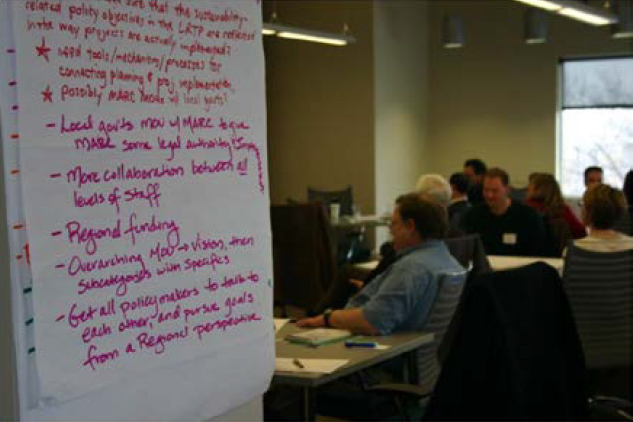An Eco-Logical Approach to Transportation Planning in the Kansas City Region

Stakeholders participate in meetings to devise the Action Plan. (Courtesy of
MARC)
Mid-America Regional Council
| Total cost: |
$180,000 |
| FHWA share: |
$90,000 |
| Period of performance: |
24 months |
| Dates: |
March 18, 2008 – March 18, 2010 |
| Status: |
Complete |
| AOTR: |
Michael Lamprecht |
| Grant-project website: |
https://www.marc.org/Environment |
Project Goals
The Mid-America Regional Council (MARC) Eco-Logical grant project was aimed at building a framework for an efficient and sustainable transportation system in the Greater Kansas City region. MARC developed a plan titled, “Linking Environmental and Transportation Planning: An Action Plan” (Action Plan), which included the goals of formalized collaboration with regional partners, creation of a regional mitigation strategy, and alignment of transportation decisionmaking with a regional sustainability vision. Through the Action Plan, MARC sought to frame transportation priorities in the context of natural resource conservation and community goals.
Project Accomplishments
MARC’s board of directors adopted the Action Plan in May 2009. MARC staff worked with the Action Plan Advisory Group to integrate the Action Plan into its 2040 LRTP, which was adopted in June 2010. The plan includes policy direction to implement climate protection, energy, and natural resource conservation measures as a part of future transportation investments. Staff also revised project selection criteria for MARC’s planning and programming processes to include environmental considerations. MARC has begun to implement recommendations on its Action Plan, including updating its Natural Resources Inventory (NRI) for future use in LRTP project planning.
Future Steps
MARC’s Eco-Logical grant project set up a process to consider environmental issues more closely and established a mitigation strategy, which it is now working to implement. The agency’s Action Plan will also support the next update of its LRTP, starting in 2013. As part of the LRTP update, MARC will reevaluate project selection criteria and use an evaluation structure that is derived, in part, from the Eco-Logical process. MARC has also launched its Planning Sustainable Places Program, which will fund 18 small-area studies throughout the region to analyze transportation, land-use, and environmental considerations, beginning in 2013. The small-area studies demonstrate a shift to apply the Eco-Logical approach at a local, rather than regional, scale. MARC has planned other activities related to its Action Plan, including the application of a mitigation evaluation framework and the development of ecosystem services data; however, the timeline for completion may be delayed due to limited staff availability and resources.
Insights on Eco-Logical
The Eco-Logical grant project has encouraged MARC to build stronger local processes and to consider environmental data earlier in the transportation planning process. While MARC staff are familiar with the principles of Eco-Logical, such as integrating environmental data into their work, they may not recognize Eco-Logical as a brand. Although regional councils like MARC pioneer the Eco-Logical approach in their regions, they may face barriers in working through State and Federal regulations that assume a more traditional approach to transportation planning. MARC staff noted that including the Eco-Logical approach in Federal regulations or guidance would help MARC and its stakeholders better integrate environmental resources into agency products, data, and processes.
<< Return to Grant Projects

